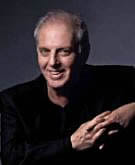
Being a pianist and a conductor he excels in the most universal language: music. Barenboim displayed his talents as a pianist during numerous concert tours. Nowadays he is considered one of the greatest conductors of our time.
His books and lectures show his unshakable faith in the humanistic message that irridiates from art in general, and music in particular. In his Nexus Lecture he continued his lifelong search for the meaning of music by trying to answer the question: what is the true imperative of beauty?
Music is a powerful art, that people can unite. But how is it possible that monsters as Hitler and Stalin could be moved by music? Daniel Barenboim raised the question during the Nexus lecture ‘The Ethics of Aesthetics’, The two dictators were not able to connect aesthetics with ethic. Music can bring together people, however, when conscience is quiet, also music is powerless. But for Barenboim there is no doubt that art without ethic cannot exist (fragments from Brabants daily paper by M. van Eck). A brilliant, engaging and humorous lecture, upon which he went into the subject with the public.
Daniel Barenboim, KBE (born 15 November 1942) is an Argentinian-Israeli-Spaniard-Palestinian pianist and conductor. He has served as music director of several major symphonic and operatic orchestras and made numerous recordings. Currently, he is general music director of La Scala in Milan, the Berlin State Opera, and the Staatskapelle Berlin; he previously served as Music Director of the Chicago Symphony Orchestra and the Orchestre de Paris.
Barenboim is also known for his work with the West-Eastern Divan Orchestra, a Sevilla-based orchestra of young Arab and Israeli musicians.